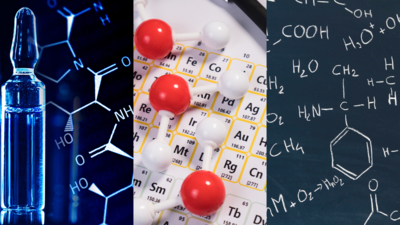CBSE Board Exam Chemistry preparation 2025: Important topics and expert tips for Physical Chemistry

CBSE Board Exam Chemistry Preparation 2025: The Central Board of Secondary Education (CBSE) has announced the date sheet for the upcoming Board exam 2025. According to the official notice, the Class 12 exams will begin on Friday, February 21, 2025, with Physics as the first subject.
The Chemistry paper, with subject code 043, is scheduled six days later, on February 27, 2025. The Class 12 CBSE Chemistry paper is often regarded as one of the more challenging subjects due to its vast syllabus and intricate concepts. However, it can be a high-scoring subject if students have a clear understanding of the fundamental principles.
CBSE Class 12 Chemistry Exam Pattern
The CBSE Class 12 Chemistry exam is a three-hour paper carrying a total of 70 marks. The question paper is divided into five sections:
•Section A: 16 Multiple-Choice Questions (MCQs) or Assertion-Reasoning questions, each carrying 1 mark.
•Section B: 5 Short Answer Questions, each carrying 2 marks.
•Section C: 7 Short Answer Questions, each carrying 3 marks.
•Section D: 2 Case-based questions, each carrying 4 marks.
•Section E: 3 Long Answer Questions, each carrying 5 marks.
Students are not allowed to use log tables or calculators during the exam. While certain topics and question types appear to be repeated over the years, it is essential to recognise that the framing and marking schemes can vary significantly.
Important topics in Physical Chemistry
According to Shlok Srivastava, Head of OCFP at Orchids The International School, several chapters and subtopics in Class 12 Chemistry are frequently emphasised due to their importance and recurrence in board exams. Here is a detailed chapter-wise breakdown of key subtopics in Physical Chemistry.
Electrochemistry
•Nernst Equation and Applications: This is a crucial topic, and students must understand its derivation, applications in calculating cell potential, and its role in predicting the feasibility of a reaction.
•Conductance of Electrolytic Solutions: Topics like specific conductance, molar conductance, and their variations with concentration are vital.
•Kohlrausch’s Law: Be thorough with its applications, such as determining the limiting molar conductivity of weak electrolytes.
•Galvanic and Electrolytic Cells: Understand the principles, including electrode reactions, and be able to draw and interpret cell diagrams.
Solutions
•Colligative Properties: Master topics like relative lowering of vapor pressure, elevation of boiling point, depression of freezing point, and osmotic pressure. Numericals based on these properties frequently appear in exams.
Chemical Kinetics
•Rate Laws and Integral Rate Equations: Focus on zero-order and first-order reactions and their integrated rate laws.
•Half-Life of Reactions: Numerical problems involving half-life calculations are commonly asked.
•Reaction Rates and Factors: Understand factors like concentration, temperature, and catalysts influencing reaction rates.
•Graph Interpretation: Be able to interpret graphs for integrated rate laws and the Arrhenius equation.
CBSE Board Exam 2025: Preparation strategy for Chemistry
To excel in the CBSE Class 12 Chemistry exam, students must adopt a structured preparation strategy. It begins with a comprehensive review of the syllabus for the 2024-25 academic year.
Students should create a detailed study plan that allocates adequate time for each chapter based on its weightage and difficulty level. Regular and consistent revision is key—dedicate one day each week to revisiting previously studied topics, as this helps reinforce concepts and ensures long-term retention.
Physical Chemistry, in particular, demands a strong grasp of numerical problem-solving. Before attempting any numerical, it is crucial to write down the relevant formula. Practice extensively on topics such as the Nernst Equation, Gibbs free energy, equilibrium constants, molar conductivity, and Kohlrausch’s law.
Additionally, focus on Chemical Kinetics by solving problems related to average reaction rates, integrated rate laws, and the Arrhenius equation. Avoid using calculators, and ensure answers are presented neatly with proper units.
Attention should be given to key units like Electrochemistry, Chemical Kinetics, and Surface Chemistry, which frequently feature in board exams. Master frequently asked concepts such as colligative properties and integral rate equations.
Finally, graphs play a crucial role in understanding topics like reaction rates and the Arrhenius equation. Students must practice interpreting and sketching graphs for integrated rate laws and temperature dependence of reaction rates.
By following this approach, students can tackle the Chemistry paper confidently and optimise their performance.
ALSO READ| CBSE Class 12 Board Exam 2025: 15 most expected questions of Chemistry





